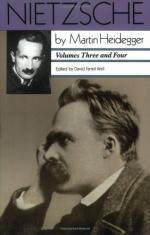|
This section contains 17,580 words (approx. 59 pages at 300 words per page) |

|
SOURCE: “Egoistic Nihilism and Revolutionary Nihilism,” in The Russian Revolutionary Novel: Turgenev to Pasternak, Cambridge University Press, 1982, pp. 4-38.
In the following essay, Freeborn traces the development of nihilism as evinced in Russian literature and assesses the impact of nihilist philosophy and literature on Russian history.
In August 1860 [Ivan] Turgenev spent three weeks in Ventnor in the Isle of Wight. During that short period, and in characteristically wet and stormy English summer weather, he conceived the figure of his most significant literary hero, Bazarov, of his most famous novel, Fathers and Children, published two years later. The reasons for Turgenev's apparently sudden creation of such a positive hero, at such a moment in his life and in such an unlikely place, involve the much larger question of the ‘revolutionary’ situation that existed in Russia on the eve of the emancipation of the serfs in 1861.
The reforms upon which...
|
This section contains 17,580 words (approx. 59 pages at 300 words per page) |

|


